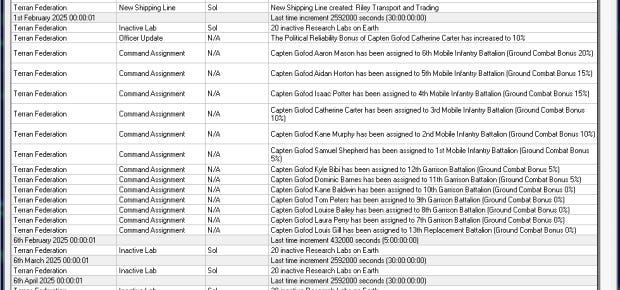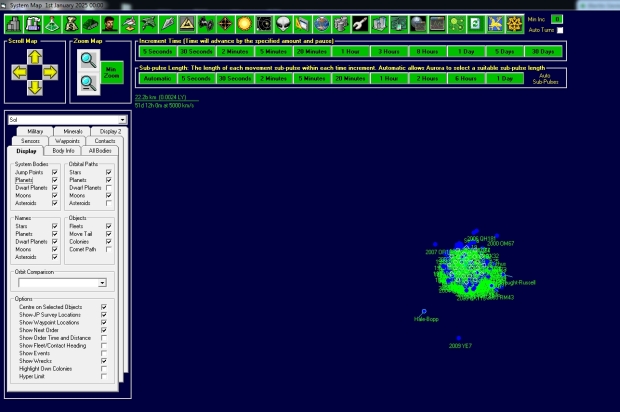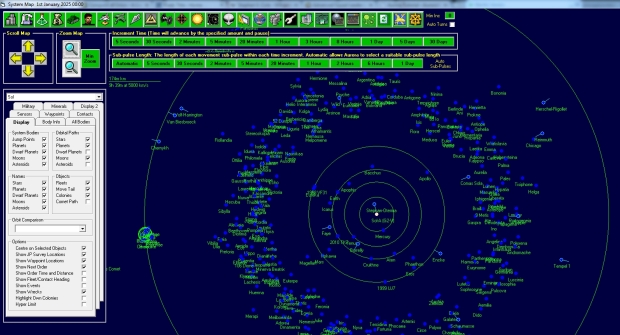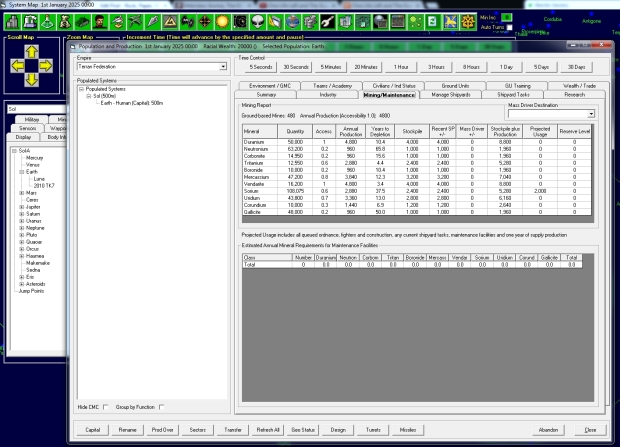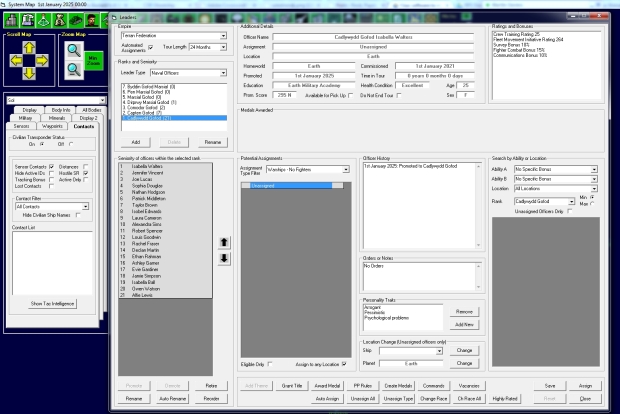Interview: Aurora, The 4X Sci-Fi Dwarf Fortress
from star wars to star shipping
I'm halfway through a tutorial on Aurora's vast wiki. It's 3375 words long, and it's talking me through how to create a new galaxy in the 4X science fiction strategy game. I'm at the point of choosing my 'Main Empire Theme', and there are over 60. Canadian? Tolkein? Ancient Egypt? Demonic Realm? I scroll through and settle on Welsh. I skip ahead and hit Create Game.
At which point a galaxy forms, with suns, planets and moons, and then that galaxy's races are born and placed, and then I'm in. I look at my own race, the Terrans. My xenophobia stat is 75. My ideal temperature is 14.00. One of my leaders is called Cadlywydd Gofod Isabella Walters.
Aurora is most commonly described as 'Dwarf Fortress in space', and this is why. I spoke to Steve Walmsley, who has been working on Aurora in his spare time for the past nine years. He talked to me about his boardgame inspirations, enabling roleplay and After Action Reports, and what the future holds for his game.
RPS: Can you introduce yourself? Your name, where you're from, your day job... I read somewhere that for a while, you were making money through online poker?
Steve Walmsley, 48, from England but currently living in the Isle of Man. I lead the strategic analytics team at PokerStars, which is the market leader in online Poker. I started at PokerStars about three years ago and prior to that spent six years playing poker (live and online) for a living. Before going into poker I did a variety of different jobs, including sales, professional musician, C++ programmer, etc but eventually settled on management consultancy, running large multi-national IT projects for various blue chip companies.
RPS: What was the initial idea when you started making Aurora?
I originally programmed an assistant program for a pen & paper game called Starfire (mainly as a way to learn Visual Basic as I was a C++ programmer at the time). Originally designed in the 1970s by Stephen Cole (of Star Fleet Battles fame) Starfire is a game that has tactical combat, albeit much simpler than Star Fleet Battles, but it also had a playable campaign system. Well playable, if you didn’t mind spending 30 minutes to roll up each new system. It is a generalization but I do think that gamers brought up on Advanced Squad Leader, Star Fleet Battles, Longest Day, Pacific War, etc. have a lot more patience for a game like Aurora than those brought up on PlayStation shooters. In a way, I think Aurora is an attempt to recapture some of those sweeping, epic board game experiences of the 70s and 80s.
I decided to create my own game using the Starfire Assistant software and Aurora was born. At first I only made small changes but over time I revamped the entire software and while Aurora shares a few things in common with third edition Starfire in terms of flavour and genre, the mechanics are now totally different.
I wanted an epic, sci-fi game with a broad sweep of history in which I could build Empires with different personalities (for want of a better word). I also wanted a living, breathing Empire that would run partially by itself (the civilian sector and the default, conditional and cycling orders) so you could look at the strategic side of the game and delve down into detail where necessary. When aliens arrive, you should have to worry about the commercial traffic of the Empire rather than being purely military-led.
I wanted detail, complexity and variety but not micromanagement, which is why you can automate significant portions of even large battles or get involved in targeting individual weapons. It's very important to create background and fluff, which is why there is so much emphasis on role-play aspects within Aurora and why everything is customizable so you can design your own settings. Aurora is also designed with writing after action reports in mind (something I did a lot with Starfire), so many things are setup up to allow easy transfer of information into text form.
As I converted from the Starfire software, I used many games and other sources as influences. The naval game Harpoon and the Starfire and Honor Harrington novel series are major influences, but also Babylon 5, Battlestar Galactica, Starship Troopers and even Warhammer 40k. Many small details come from other games; the armour rules are similar to a FASA game called Interceptor while the idea of wrecks came from EVE Online. A lot of the game though is from player requests and suggestions.
RPS: A lot of the content in Aurora is randomly generated when a player starts the game. Is it about getting around development limits, or what benefits does it offers players?
Aurora is really a game for me to play that I just happen to make available to others. With that in mind it needs to have a lot of random elements so I don't know what is going to happen.
RPS: Do you run into technical limitations when creating a game as complex as Aurora?
Because the graphics are so basic I don't really run into any technical limitation. You can run the game on very basic hardware - it just takes longer to process turns. The main limitation is screen size. The minimum resolution requirement is 1280x1024 because that was the resolution of my smaller secondary monitor when I was writing the basic game. Remember, this really is a hobby project that has turned out to be popular - not a game intended for commercial release.
RPS: What made you want to create such a complex and large game?
I love the scale and detail of monster games and used to play monster board or map-based wargames in the 70s and 80s. These days it is very difficult to find computer games that offer a similar experience because commercial games have to appeal to the mass market. I created Aurora because I wanted to play that type of game and couldn't buy it.
I think there has always been a desire from a small segment of the gaming population for this type of game. Before computer games, there were board games that took months to play, such as the World War III series from GDW, the Europa series, etc..
RPS: Do you ever think about making the game more accessible?
Accessibility isn't really a concern. I'm not trying to make it a commercial success and the vast majority of gamers will not have the patience or inclination to learn to play anyway. Aurora appeals to those gamers for whom the mass market games don't offer the experience they want. The gamers who will enjoy Aurora are also the gamers who are prepared to dedicate the significant time and effort required to learn how to play.
RPS: What is it that drives you to continue working on a project for such a long period of time? How do you remain motivated?
It's fun! That's the only reason. The chance of new features being added is directly proportionate to how much fun I think they will be. Features that I wouldn't use myself tend not to be added. I know that sounds selfish but it goes back to motivation. Anything you want to do is fun. Anything you have to do is work.
I do take breaks from Aurora though when my enthusiasm wanes. I have a lot of hobbies and interests and not enough free time. I always find myself coming back though to play new campaigns and implement new ideas. Another great aspect of the game is the community. The Aurora forums are exceptionally good (run by Erik Luken) with everyone being very polite and helpful. We are extremely tough on anyone who makes personal comments or attacks.
RPS: You mention that you're mostly concerned with supporting roleplay. Is it that which drives the design of the game?
Aurora wasn't designed and then built, or even planned out in advance. It has evolved over the last nine years, with new additions and many changes to existing features. My core principles are that the game has to be internally consistent and it has to be fun. All the systems and modules in the game follow the same rules of Aurora physics, so whether you are building a missile or a battleship they obey the same principles.
It creates a very believable and immersive environment. Players are constantly coming up with new tactics and designs and I am often surprised by how ingenious they can get within the framework of the rules. I must confess that when adding new features, even hugely complex ones, I don't plan it out or design it first. I just start programming and keep in my head a general outline of where I am going. That direction sometimes changes along the way as I have new ideas or encounter problems. This would be a complete nightmare for everyone if I was working as part of a team but it works well for my hobby programming.
RPS: You began work some time ago on Aurora 2, before putting it on hold. What's your intent when it comes to starting fresh with a sequel?
There are two 'sequels' that are partly underway. Aurora 2, written in C#, and Newtonian Aurora, which is in VB6. Aurora 2 has nicer graphics but in the end Aurora was never about graphics - it's about gameplay. It's really an old style wargame with many RPG elements that you happen to play on a PC. The computer makes playing easier but you could replicate a lot of the game with pen, paper, some dice and a calculator. The action is taking place in your head, not on the screen. So I guess Aurora 2 is on hold because I would rather add new features than spend time making the game look prettier.
Newtonian Aurora is an attempt to create a version of Aurora based on real Newtonian physics, rather than the wet-Navy physics used in Aurora (explained away with the some techno-babble). Its a lot more advanced in terms of development than Aurora 2, a lot more complex than Aurora and has some very cool features. That is also on hold for the moment, mainly due to a lack of free time since I started my current job, but I am more likely to go back to that than Aurora 2.
RPS: Do you play many other games? What games, past or present, do you love?
I play many many games. At sixteen or so, I discovered Avalon Hill board wargames such as Panzer Blitz. This was an amazing revelation as my cousin and I thought we were the only people in the world who liked wargames. I still have three copies each of Panzer Blitz and Panzer Leader on my shelves, in mint condition.
Other Avalon Hill games I still have in my collection include War and Peace, an early Napoleonic game, Flat Top, a great carrier game, Longest Day, Submarine, Bismarck and many others. I have all four of the original Squad Leader games and most of the ASL series, including many of the flat box series with paper maps such as Red Barricades or Kampfgruppe Peiper I & II.
Then I discovered Victory Games, which led me to the Fleet Series, Gulf Strike, Ambush and a lot of others, including my favourite, Pacific War, which I once played solo and it lasted months. SPI as well - my favourite SPI/TSR game was Terrible Swift Sword. GDW is also another of my favourite publishers and I have a lot of their games. Eight boxes from the Assault Series including duplicates, the Third World War series, which was a great multi-game series that I played to completion twice using all four games, Twilight 2000, 2300AD, Star Cruiser, the GDW version of Traveller, etc.
I am huge SFB fan and have a mass of Star Fleet Battles products, including every Captain's Log since #1. I am rereading through them at the moment. Looking at my shelves I can also see several Battletech games, Renegade Legion, two editions of World in Flames, many Babylon 5 Wars books, etc. Too many games to list really. I am an RPG fan as well, particularly RuneQuest 2nd Edition, as well as Traveller, AD&D, etc.
Early computer game memories include Carrier Command and Red Lightning on the Atari, NATO commander on the Commodore 64 and one of my all-time favourites, Elite on the BBC Micro. It was the first game on floppy disk rather than tape games for the older Dragon 32 and I remembered being awestruck by the 2 second load time compared to several minutes for tape. Then the 286 arrived and eventually I bought a 386 to play Links 386.
In the golden age of computer gaming (the 90s) I played Master of Orion, Master of Magic, UFO: Enemy Unknown, Civilization, Dune, Harpoon, etc. These days I play EVE Online, Civ V, a lot of Paradox games, the Total War games, etc.
Note: This interview was conducted via email and has been edited.
